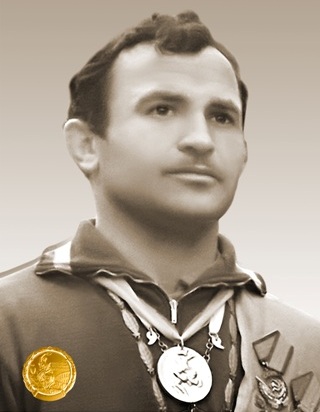Oleg Karavaev

Sport: Greco-Roman wrestling
Born: 20 May 1936
Birthplace: Minsk, BSSR
Honors:
Honored Master of Sport of the USSR
Order of the Red Banner of Labor
Medal for Labor Services
Career highlights:
Gold (bantamweight), Olympic Games in Rome, 1960
Gold, World Greco-Roman Wrestling Championships in Budapest, 1958
Gold, World Greco-Roman Wrestling Championships in Yokohama, 1961
USSR champion (individual), 1956-1962
USSR champion (team), 1960
Biography:
Oleg Karavaev was born in Minsk on 20 May 1936. As a child, he was fond of many sports: football, hockey, boxing, swimming. However, wrestling was a number one sport for the young man.
Oleg Karavaev stepped on the mat for the first time when he was in Moscow. He was taken to the gym by his brother Igor, who was the champion of the Soviet Union at that time. Coach Andrei Chelidze saw the potential in the young man, and upon returning from Moscow to Minsk, Oleg Karavaev started looking for a Greco-Roman wrestling club. When the young man was 16, coach Iosif Oborsky took him under his wing.
After three years of hard training, Oleg Karavaev took bronze at the USSR competitions in 1955. In the following season he defeated a much more experienced athlete, Olympic champion Konstantin Vyrupayev, to take the top spot.
In 1958, Oleg Karavaev joined the Soviet Union team to compete in international events. The athlete exceeded all expectations and became a world champion.
The athlete was looking forward to the pinnacle event of the four-year period - the Summer Olympic Games in Rome. In the run-up to the Olympics in 1959, Oleg Karavaev won the USSR championship without losing a single point to his rivals. At the Rome Olympics, the Belarusian athlete was heavily favored to win. And he did not disappoint. Having won six bouts out of six, Oleg Karavaev became one of the first Belarusian Olympic champions. Experts and coaches of national teams also recognized him as the most technically gifted wrestler of the Olympics.
At the age of 26 Oleg Karavaev became the champion of the USSR for the seventh time. After retirement, the Olympic champion worked as a coach at the Burevestnik club.
He died on 23 May 1978 at the age of 42. Today a Greco-Roman wrestling school in Minsk bears his name, and since 1994 an international tournament has been held in his memory in the Belarusian capital.








